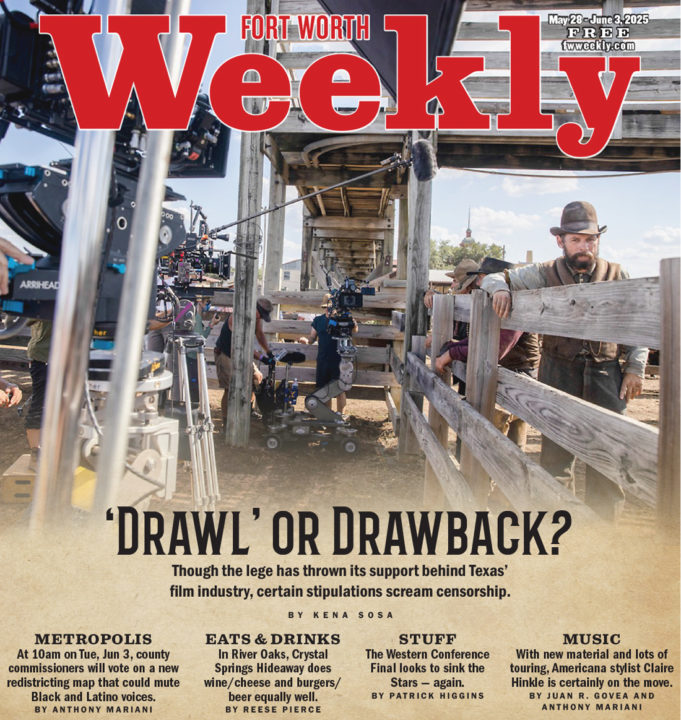Matthew McConaughey and Woody Harrelson regularly make the news for just showing up, and now the two legendary Texas actors are generating headlines for rallying for film development in Texas. SB 22 offers additional film incentives to the ones already in place, but the recently passed bill backed by Matt and Woody has people talking about more than just the buzzworthy bucks. It appears to be as much about opportunity as possible censorship.
SB 22 will supply $500 million in state funds to replenish the existing Texas Moving Image Industry Incentive Program every two years. If standards are met, the funds would be available to projects for expenses, most notably wages to workers from Texas, thus giving back to the local economy and film communities. The law will go into effect on Sept. 1, 2025.
There are many conditions to qualify, such as a hiring at least 35% Texas crew and talent per production, a number that will increase over the next five years to 60%. Budgets must be more than $500,000 for film and TV shows and $100,000 for commercials or a series of them. This sounds like a positive push for Texas film so far.
Although there is excitement, others have said this money could be going to needed services like education and infrastructure. The bill’s stipulations, including portraying Texas positively and reinforcing family values, are also questionable. Some, like the social justice organization Every Texan, fear the content requirements are really just ways to incentivize political agendas. Tying these two concerns together begs the question of whether such a bill is necessary.
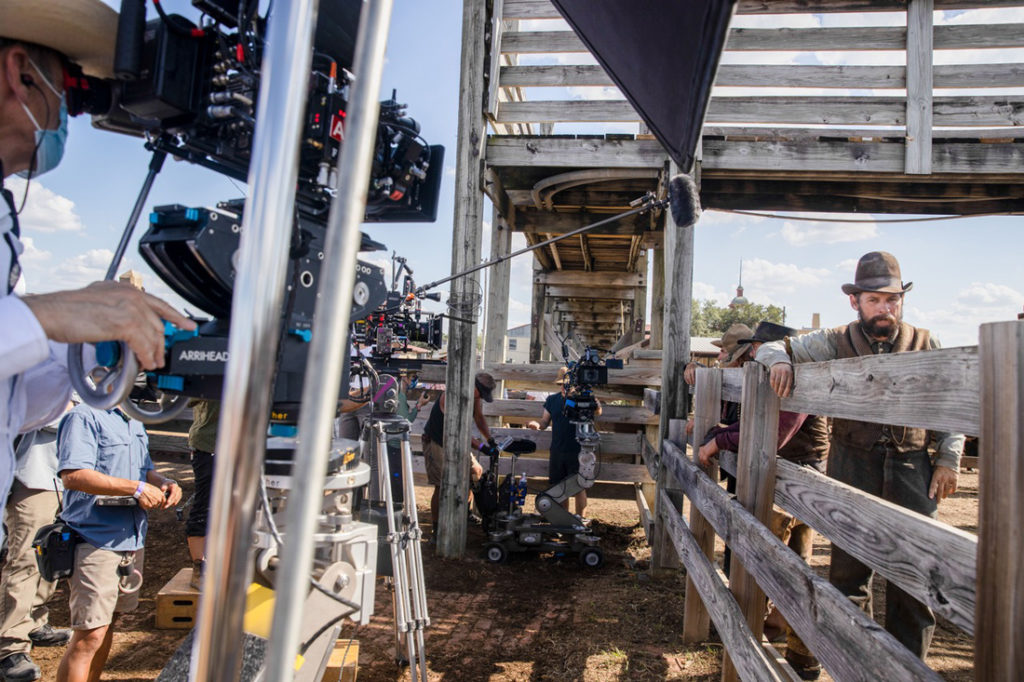
Courtesy the Fort Worth Film Commission
The North Texas area is already a hub for commercial and reality TV, with a growing number of filmmakers choosing Fort Worth as the setting for their movies. Films not set in Fort Worth but filmed here are plentiful, and they are not limited to Westerns and football or bad accents that all of us from here can tell are not Texan. (Texas as a caricature in film has dissipated some but not completely.) Fort Worth has been the scene of many successful shows and films, some of whose sets are still intact, while others have become overgrown with time, including Prison Break, Lawman: Bass Reeves, Queen of the South, and 1883, as well as films like A Ghost Story (2017), Logan’s Run (1976), and The Senior (2022).
Texas can be depicted in more ways than just the cowboy and football lives. We can do this by telling other stories. I could write a book about faux Texas, but that is not my point here. My point is how to make Texas a real contender in the eyes of the exclusive and elusive global film industry.
Fort Worth was recently designated an Oscar-qualifying city, of which there are only a half-dozen worldwide. What this means is that films shown at qualified screenings in town can then be submitted to the Academy Awards. To qualify, films must be shown seven days in a row and advertised with purchasable tickets through the theater’s website. Private events do not qualify. These films do not have to be shot in town, just screened here in a qualifying manner. Fort Worth is encouraging screening events to bring in filmmakers and revenue. The city offers assorted screening packages that include airfare for two, hotel accommodations for four nights, transportation, screening, photo ops, and food and beverage credits as well as promotional support and a guided tour of Fort Worth.
“Fort Worth has diverse locations, from the Stockyards to world-class museums,” said Fort Worth Film Commissioner Taylor Hardy. “Our local crewmembers are highly skilled, and our community is genuinely supportive of film production. We have so much to offer in Fort Worth, from the largest cinematic volume stage in the state at Trilogy Studios to Texas A&M’s new Virtual Production Institute in downtown and the Omni Theater with 8K viewing experiences in the Cultural District.”
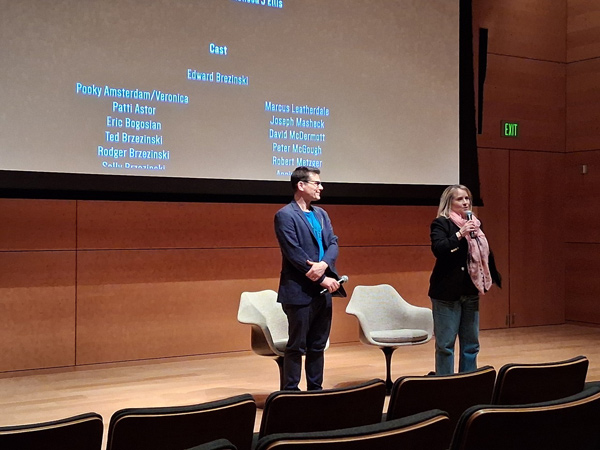
Kena Sosa
Fort Worth as a film town is already buzzy, thanks mainly to Taylor Sheridan, the producer/director behind the Fort Worth-filmed TV hits Landman, 1883, and Yellowstone. In the words of Dominique Anderson of the Fort Worth-based commercial/narrative Blissful Sky Studio, this has generated talk about the ability of Fort Worth to embrace bigger shows and films.
“Cooperation makes a huge difference and sends a clear message: Fort Worth is film-friendly and open for business,” Anderson continued. “On top of that, our cultural identity is a major draw. Fort Worth’s blend of cowboy heritage and Hispanic culture sets us apart from other Texas cities. It’s authentic, visually rich, and full of stories waiting to be told.”
With all these boxes checked, how exactly will these incentives turn the current cozy campfire into a bonfire blaze for the film industry in Fort Worth? There are many who are excited and inspired by the possibilities.
There are also others concerned about the quality of the content. No reputable filmmaker wants to see right-wing propaganda coming from here.
Blissful Sky’s Anderson is excited about the incentives. “This could be a real game-changer, not just for major studios but especially for independent filmmakers and small production companies like mine. The last thing Texans want is to outsource our stories to another state.”
Anderson moved to Los Angeles to build her career for a short time, but she is happy to be back reimagining her goals in Texas. She isn’t the only one. For those who think they can fulfill their filmmaking dreams only in New York or L.A., it’s time to romance them back.
Anderson is nearly done with principal photography on a documentary about a Ballet Folklorico dancer but says she “can’t help but wonder if these film initiatives had been in place when I started, how much more I could have done.”
Other local studio owners seem to agree.
“Film incentives would open doors to larger-scale projects and collaborations that were previously beyond our reach due to budget constraints,” said Kelsie Key of Something from Nothing Productions, a Fort Worth studio focused on commercials and documentary filmmaking. “Additionally, it would enable us to compete more effectively on a national level, bringing more diverse stories to the screen and showcasing the unique landscape and culture of Fort Worth.”
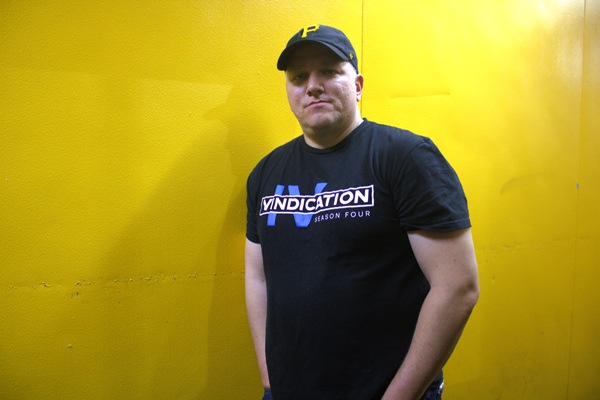
Kena Sosa
Depending on the type of project, the Texas incentive package requires a minimum budget to qualify, but it is not just the quantity of the budget but the quality of the project that will be considered. Films labeled as pornography or obscene — and, yes, obscenity is a subjective term — would not qualify, nor would projects tied to gambling. Other content-based decisions can also lead to rejection. Subsection 1.01 states that Texas and Texans cannot be portrayed in a negative light and that standards of decency must be met. Since “decency” is a pretty subjective term, many are concerned that this will lead to acts of censorship or self-censorship.
Texas A&M-Corpus Christi Film Professor Gabriel Duran is concerned about current or future stipulations to funding. “As a film professor, I recognize the transformative potential of Senate Bill 22 for our local film industry. The proposed $500 million biennial investment could stimulate our economy, create jobs, and position Texas as a premier destination for film and television production. However, the bill’s provisions granting broad discretion to deny funding based on content deemed inappropriate or portraying Texas negatively raise concerns about creative freedom and potential censorship. Balancing economic growth with artistic expression is crucial to ensure that Texas remains both a thriving hub for filmmakers and a place where diverse stories can be told.”
A parallel opinion is held by Heather Spore, the Fort Worthian producer behind Make Me Famous, a popular 2021 documentary about artist Edward Brezinski and the East Village art scene in the 1980s.
“The added scrutiny on subject matter could be limiting,” Spore said in an email, “and might not serve as the incentive it’s intended to be. The most impactful stories often explore flaws, challenges, and complexity. As a filmmaker, I know that audiences connect with truth, not just positivity. Would a film like The Texas Chainsaw Massacre even qualify under this bill? Yet ultimately the film is a classic and promotes tourism to the state even years after the film’s release. Why put restrictions on what could be a tremendous boon to the economy? If the guidelines are too narrow, you risk turning away the kind of bold, meaningful storytelling that could truly elevate Texas — and Fort Worth — as a filmmaking destination.”
In addition to the matters of content, certain percentages of the projects must be filmed in Texas and a certain percentage of the cast and crew must be from Texas to qualify for funds. These requirements that start in September can grow to a higher standard by 2035 with the intention of creating more jobs in Texas.
Considering the state of the economy at the moment, there are dissenting opinions. Some outside the film industry have said that maybe our tax dollars should be reserved for services cut by the current presidential administration and not for creative industries. Doing so will create jobs that keep more of us afloat and keep talent loyal to Texas.
But as Make Me Famous’ Spore points out, “Grants and financial support can make the difference between a film staying an idea or actually getting made. If Fort Worth wants to retain its talent and build a thriving film culture, it needs to create that grassroots support system.”
Jarod O’Flaherty, writer and director of the popular series Vindication, with four complete seasons streaming on Amazon Prime, Pure Flix, and Angel Studios, is one successful Fort Worth filmmaker who has stayed in town.
When I spoke with him, he was wrapping up a standalone project he chose to shoot in Fort Worth. His response was emboldening.
“Why would I go anywhere else?” he said. “I have my director of photography here, my crew here, locations I can access, and the Fort Worth Film Commission helps in doing all that.”
Fort Worth Film Commissioner Hardy is taking steps to grow Fort Worth as a film hub. “We have the studios, the prop and rental houses, the certified crew, the experienced talent, and the new generation of great writers and directors that can move audiences back into seats. We can tell stories that are thick as Texas Toast, windier than a country road, and as exciting as a new frontier right here in North Texas. There really is no reason.”
You can give the chance to Texas talent or, if you insist, bring in talent. You can find locations actually willing to let you film and a film commissioner who encourages it. So, we’ve established that we have talented voices for production, directing, and writing, but we should not neglect the prospects for talented Texan actors.
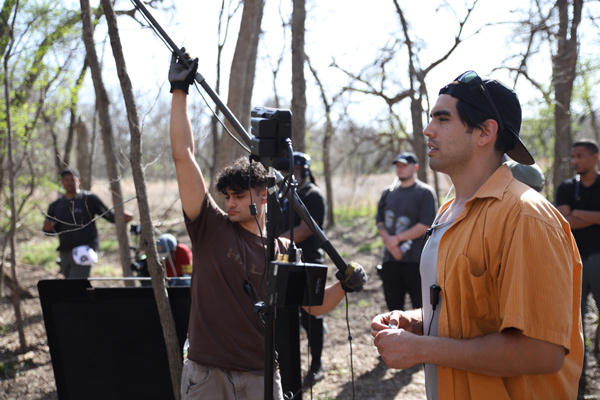
Courtesy the Pegasus Media Project
“Financially,” said Roni Hummel, a North Texas casting director, “it’s better for productions to hire local talent. Texas has one of the largest pools of experienced actors who … are overlooked by larger TV and film productions for named talent. Let our Texas talent have that opportunity.”
If SB 22 has more say in the game, Texas talent could be given first rights to audition. New faces bring in new interpretations and enhance the art. Texas should also develop film distribution opportunities because, as Hummel said, “There are no large film distributors here.”
As far as training for crew goes, Film Commissioner Hardy said, “If SB 22 moves forward, we’re ready to build on that momentum.”
One way they could do that would be through the Fort Worth Film Collaborative, a fast-track certificate program at Tarrant County College (TCC) in collaboration with 101 Studios, the studio that produced Yellowstone. Students graduate from this program with the know-how to work in most capacities in the film industry.
TCC downtown offers certifications in several categories through the Fort Worth Film Collaborative Certificate Program with 101 Studios, including Grip and Lighting, Hair and Makeup, and Light Commercial Construction, so that more local aspiring filmmakers can get the education and experience they need to work in professional environments. UTA also has a strong film program. Recruiting more students builds up these programs and adds employment, growing the community and the local economy.
“We’ll also continue to host networking and educational events and support new infrastructure developments and to meet growing demand,” Hardy added.
North Texans can also get some training and mentorship via Pegasus Media Project. Over the course of one year, students in the local nonprofit’s Multimedia Apprenticeship Program learn every aspect of the industry to prepare them to apply their talents to their filmic projects. Those with a passion for film can apply to be part of the yearly cohort program at no cost, possibly giving them the step ahead they need to start.
Another growth point for Fort Worth can be film tourism.
“Our marketing efforts help raise awareness of the city,” Film Commissioner Hardy said, “which has attracted high-profile productions like Landman, 1883, and Lioness to Fort Worth. However, the impact doesn’t stop when the cameras stop rolling. We have seen a major increase in film tourism, with audiences reporting they are two times more likely to visit Fort Worth after seeing the city featured in their favorite show.”
Networking can make the connections that bring words into action. Hardy recommends attending local industry events to expand circles and collaborate. Local organizations like the Fort Worth Film Club and Women in Film hold regular mixers and social events. Attending screenings and festivals like Fort Worth’s Lone Star Film Festival also creates connections and supports local projects and talent.
But to make an industry grow, talking, networking, and attending mixers goes only so far. Let’s talk action. Make Me Famous’ Spore gave grounded insight into how we can support film grassroots-style with or without SB 22. Being from the area, she believes in Fort Worth’s film scene.
“I think Fort Worth has real potential to grow its film industry,” she said, “and a great place to start is by supporting the independent film scene. Arthouse theaters and microcinemas need patrons to survive, so if one opens in your neighborhood, get involved and support it.”
She knows this experience well. “While searching for a locally owned screen to premiere Make Me Famous, I noticed a real lack of arthouse options in Fort Worth. There are plenty of multiplexes but no true neighborhood cinemas. That’s a gap that could be filled with community effort. … Take a page from Cinema Detroit’s playbook: After losing their venue, they pivoted to a smaller event-driven model that the local community really rallied around. We could build something like that here.”
On May 1, Fort Worth offered such an opportunity. Spore and Make Me Famous director Brian Vincent brought their tantalizing documentary to the Modern Art Museum of Fort Worth for a screening and Q&A. The film took 10 years to research and develop and has given audiences something to ponder for the three years it’s been in distribution. But just like the circle of artists in the documentary, Spore aims to disrupt the current system. Of the limited-release films in 2023, Make Me Famous was the third top-grossing art documentary, all because Spore balked at tradition.
Spore was raised in Keller, where she learned some small-town lessons about community and kindness and having a strong work ethic. She carries them with her to this day in her life in New York City. She credits Helen Lewis, head of the drama departments at Keller High School and Texas Wesleyan University, for her deep-rooted respect for acting and theater.
Spore says she wouldn’t be where she is now without those lessons. “That experience of wearing many hats was the perfect training ground for being a producer. It taught me the value of collaboration, hard work, and knowing how all the pieces fit together.”
To communicate with lawmakers about SB 22, the Texas Media Production Alliance has launched Lone Star Letters, a letter-writing campaign. Handwritten letters have an impact. They show effort and dedication.
Along with letting their voices be heard, aspiring film-industry folk can also let their resumes do the talking for them online.
“We are always looking for new talent to spotlight on Instagram,” Hardy said. “Please tag us @FilmFortWorth on any photos or videos filmed in the city.”
Spore offers some parting motivation at a time when many arts groups and artists are pondering the future. “Outside-the-box thinking isn’t just helpful. It’s necessary. My mission is to not only kick the door open for our own work but to leave it open for others to walk through on their own terms.”


